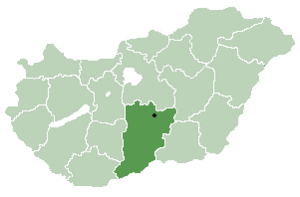Dusnok: Difference between revisions
LaaknorBot (talk | contribs) m Robot: Adding zh:杜什诺克 |
m r2.6.5) (Robot: Adding vi:Dusnok |
||
| Line 70: | Line 70: | ||
[[sk:Dusnok]] |
[[sk:Dusnok]] |
||
[[sl:Dusnok]] |
[[sl:Dusnok]] |
||
[[vi:Dusnok]] |
|||
[[zh:杜什诺克]] |
[[zh:杜什诺克]] |
||
Revision as of 14:54, 10 August 2012
Dusnok | |
|---|---|
| Country | |
| County | Bács-Kiskun |
| Area | |
| • Total | 57.47 km2 (22.19 sq mi) |
| Population (2005) | |
| • Total | 3,396 |
| • Density | 59.09/km2 (153.0/sq mi) |
| Time zone | UTC+1 (CET) |
| • Summer (DST) | UTC+2 (CEST) |
| Postal code | 6353 |
| Area code | 78 |

Dusnok (Croatian: Dušnok) is a village in Bács-Kiskun county, in the Southern Great Plain region of southern Hungary.
Geography
It covers an area of 57.47 km2 (22 sq mi) and has a population of 3396 people (2005).
Demography
Population is consisted of Magyars, Croats, Germans and Roma.[1]
Croats from Dusnok came to that area in 16th century from Slavonia. They speak Štokavian dialect of Croatian language, a Slavonian subdialect (Old-Shtokavian with non-reflected yat pronunciation). Similar dialectal features are seen today among population of Gradište near Županja (in western Syrmia) and around town of Našice in central eastern Slavonia (both in northeastern Croatia).
These Croats belong to special group of Danubian Croats: they call themselves Raci. In literature they are also called racki Hrvati.[2]
Dusnok Croats' feasts are Veliko racko prelo .[3], Racki Duhovi or Racke Pinkusde (since 1993. [4]), Ivanjdan, August 20th and Berbena svečanost (Harvest celebration).
History
Its name was mentioned first in a document issued between 1193-1196 by King Béla III. Dusnok was devastated by the Ottoman invasion in 16th century. In 1639 as an abandoned place was the property of János Miskey and István Veres. At the end of 17th century Catholic settlers from Dalmatia and Bosnia arrived. In early 18th century Dusnok was reclaimed by the Counts Cseszneky, however eventually it became the property of the archbishop of Kalocsa. In 1864 the village suffered from a huge blaze.
References
- ^ Template:Hu icon Dusnok község honlapja Kisebbségek
- ^ Template:Hr icon Template:PDF Sanja Vulić: O govorima Hrvata u Mađarskoj
- ^ Template:Hr icon Croatica.hu Prela, balovi i pokladne zabave u Bačkoj 2008.
- ^ Template:Hu icon Template:Hr icon Horvát kisebbségi önkormányzat


